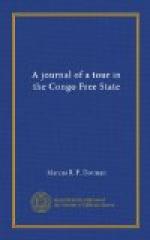The quarters of the Force Publique here are very comfortable. Each man has a room to himself about seven feet square constructed of brick and the sergeants have a small house, each containing two rooms and a verandah. I looked into one or two and they were well arranged. Bed and mosquito curtain, table and chair with a few pictures and ornaments, showed what an advance the native had made in civilisation since he slept in a hut on the mud floor.
Finally we visited the motive power which enables all this to be done, the rubber stores. Here people were busy sorting and packing the precious material into baskets ready to be carried to the Barge which was waiting to sail.
CHAPTER X.
Stanley Falls to London.
The prison gang arrives at 8 a.m. on the morning of December 18th and at once my baggage is carried down to the river and placed on board the Barge. It is a novel sight. A long line of prisoners chained together, slowly marching down the road with bales, boxes, chairs, tables and portmanteaus on their heads. No method could be simpler or more secure for transporting baggage. The Barge—as the name implies—has no means of propulsion and depends for her locomotive power upon a powerful steam tug which is attached alongside. The whole space in the ship is thus devoted to cargo and only passengers who are sick are carried, the accommodation being limited, but there is a fine deck on which to sit or walk about. The Barge is of about 400 tons burden and is therefore as large as the mail passenger boats, and the great advantage of travelling in it is, that since there is absolutely no vibration or motion to be felt, it is very comfortable for writing.
As the navigation of the river is difficult near Stanleyville, a pilot takes all the boats down the first day’s journey and returns in the next vessel ascending. On the way we called at the Catholic Mission for one of the priests who wished to travel to La Romee and I was astonished to find he was quite ignorant of the agitation against the Congo, which was taking place in Europe, and wondered, as many of us do, what was the cause of it, for he knew nothing of atrocities or cruelties to natives.
Afterwards we stopped at Yakussu for wood and then at La Romee where there is an extensive farm. Here we take on board some fresh vegetables and cow’s milk which however, is not fit to drink an hour afterwards. The climate in the Congo is very bad for all kinds of food. Antelope, killed in the early morning, is often rotten by the evening, and thus the difficulty of obtaining fresh food is greatly increased. The rapidity with which flesh decomposes is, perhaps, the reason why the natives prefer it in that condition, for as it is so difficult to obtain meat fresh, they may have acquired the taste for it rotten, just as some civilised people train their palates to prefer game high. It is however, very disgusting to




